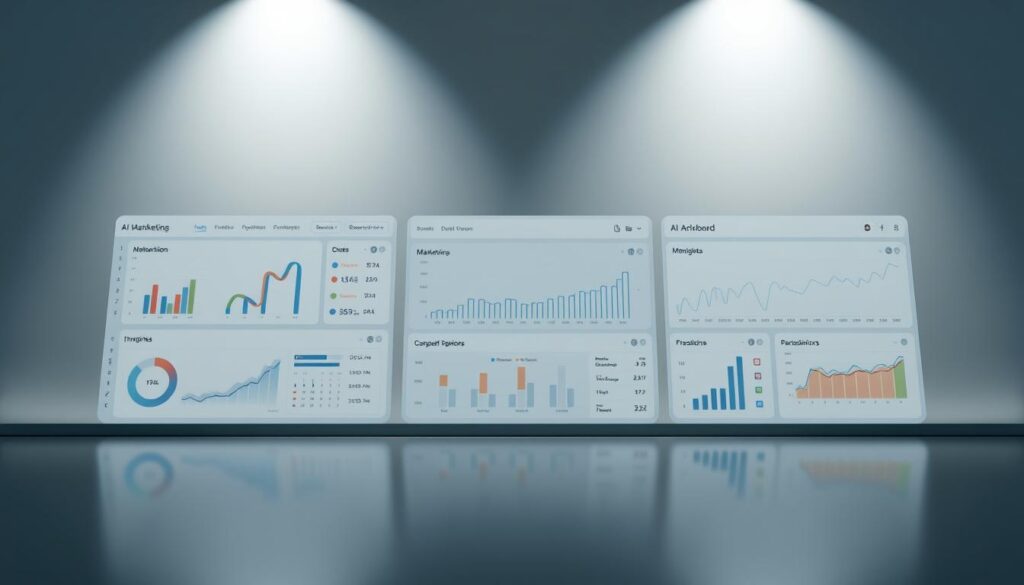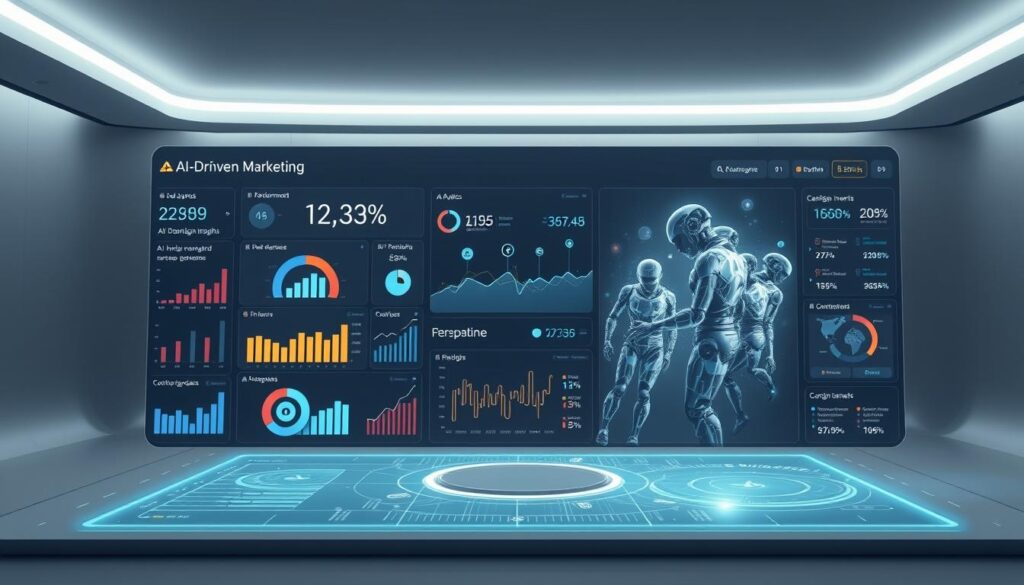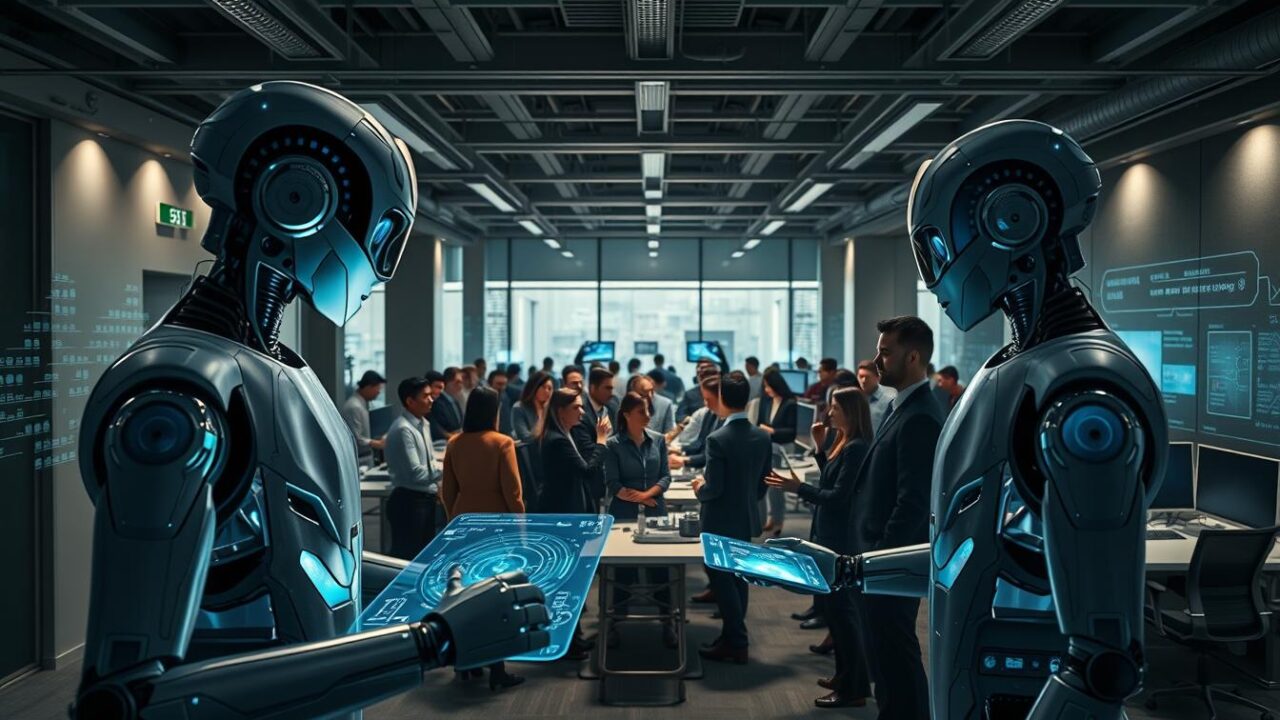Imagine if your marketing team could work non-stop. They could learn from every customer and adjust plans instantly, all without needing you.
The world of digital marketing is changing fast. At the heart of this change are AI agents. These smart systems do more than just automate tasks. They understand data, make choices, and act on them with little human help.
Unlike old marketing tools, AI agents can think and change. They keep learning and adapting. This lets them handle complex marketing tasks that humans usually do.
Numbers show how big this change is. The AI agent market is expected to hit $47 billion by 2030. McKinsey says generative AI could add $4.4 trillion to global productivity. Marketing and sales teams will see the biggest benefits from these new strategies.
AI agents are more than just better software. They change how companies talk to customers, manage campaigns, and make big decisions. With natural language processing and machine learning, they get what’s happening and make smart choices. This is something old automation can’t do.
Key Takeaways
- AI agents operate autonomously, making decisions and taking actions without constant human supervision
- The ai agent marketing org represents a shift from rule-based automation to adaptive, intelligent systems
- These systems follow a continuous loop of perceiving, reasoning, and acting to optimise marketing outcomes
- The AI agent market is projected to reach $47 billion by 2030, signalling massive industry adoption
- Marketing and sales departments are among the primary beneficiaries of AI-driven productivity gains
- AI agents leverage natural language processing and machine learning to understand context better than traditional tools
Understanding AI Agents in the Context of Marketing

AI agents change how marketing tech works. They don’t just follow scripts like old tools do. They can see, understand, and act on their own.
They learn from lots of data and change with new info. This lets marketers do better and reach people in new ways.
What Sets AI Agents Apart from Traditional Marketing Automation
Old marketing tools follow set rules. AI agents are different because they can adapt. They look at many signals, guess what customers want, and act on their own.
While old tools stick to rules, AI agents keep learning and changing. This makes them smarter and more useful.
Looking at ai marketing analytics, AI agents do more than just report. They find new chances and trends that humans might miss.
The Evolution from Rule-Based Systems to Autonomous Decision-Making
Marketing tech has grown a lot. It used to be simple, now it’s complex. AI agents can handle lots of data and change fast.
This change is like how phones have evolved. AI agents are like smart phones for marketing, making decisions without us.
AI can sort customers into groups based on what they do and who they are. This means marketing can be more precise and change as people do.
Core Components: Perception, Reasoning, and Action in Marketing Applications
AI agents work in three main parts:
- Perception: They gather data from many places. They understand what people say and feel from text and emails.
- Reasoning: They use smart algorithms to make decisions. They think about what they’ve learned and what they want to achieve.
- Action: They carry out their plans and check how they’re doing. They work with other tools to make sure everything runs smoothly.
These parts work together to make marketing smarter. AI agents work quietly, always trying to do better while keeping things consistent and following rules.
The AI Agent Marketing Org: A New Paradigm for Digital Marketing

The old ways of marketing are changing fast. The ai agent marketing org is leading this change. Now, marketers set goals and let smart systems do the hard work.
This new way fixes old marketing automation problems. Unlike old systems, AI agents change plans based on each customer’s actions. They adjust strategies quickly, not just following set paths.
Business moves fast, and AI keeps up. AI agents spot when someone is interested right away. They look at all interactions, from emails to social media, to understand what buyers want.
This approach is groundbreaking because it offers true personalisation at scale. The ai agent marketing org creates groups that change with each interaction. It picks the right content and adjusts messages automatically, making each experience feel unique.
This change lets marketing teams focus on big ideas and strategy. AI takes care of the complex work in the digital world.
How AI Agents Transform Marketing Workflows

Marketing teams are seeing big changes in how campaigns work. Old automation sticks to set rules, but AI agents change and react to each customer. This lets marketers make experiences that grow and change with real-time data and what customers do.
From Static Automation to Dynamic Adaptation
Old automation does the same thing for everyone, no matter what. AI agents look at what visitors do and change plans fast. For example, if someone from a key company looks at prices, the AI knows it’s time to send special emails or tell sales teams.
Real-Time Intent Detection and Response
AI agents watch many places at once:
- Website navigation patterns
- Email engagement metrics
- Content consumption habits
- Third-party behavioural data
This wide watch lets ai lead generation systems spot when someone wants to buy right away. They don’t wait for forms to be filled out. Instead, they reach out when interest is high.
Continuous Learning and Campaign Optimisation
Every chat helps make the next one better. AI agents learn which messages work best and which paths lead to sales. This makes ai brand promotion get better and better, all on its own. Marketing teams see more people buying as the AI keeps getting smarter, making tiny changes every day.
Essential AI Marketing Strategies for Modern Organisations
Today’s digital world needs fast and personal marketing. Traditional methods can’t keep up. AI marketing strategies help organisations offer custom experiences efficiently. This change is key to how businesses talk to customers.
Marketing automation has grown. 77% of marketers now use AI. Ross Simmonds of Foundation Marketing calls this “parallelising variant work.” Teams can now make 5-10 versions of an asset in hours, down from weeks.
Being able to adapt quickly is crucial in AI marketing. Sergey Ermakovich of HasData uses AI to update customer segments in real-time. If a customer leaves their cart, the system quickly moves them to a high-intent segment, starting a personal recovery campaign.
Anastasia Parokha of Creative Fabrica talks about micro-segmentation for personalising content. AI looks at lots of data to make specific groups for custom messages. This makes generic campaigns into personal chats.
AI marketing brings three main benefits:
- It automates repetitive tasks
- It creates custom customer journeys
- It checks content for brand consistency
Using AI in marketing also boosts engagement and cuts down on campaign time. This lets teams work on bigger, strategic plans instead of just doing tasks.
Leveraging AI for Content Creation and Personalisation
AI agents have changed how marketers make and personalise content. Now, teams can send custom messages to thousands of people at once. This keeps messages relevant and high quality. It’s a big change in how companies talk to customers and run campaigns.
Hyper-Personalised Campaign Execution at Scale
AI agents look at each user’s profile in real time. They make sure each experience is unique. When someone interacts with marketing, the AI checks:
- Where they are in the sales process
- What they’ve done before
- What they like in their industry
- How they like to get information
This personalisation goes beyond just using someone’s name. AI systems create different messages and calls-to-action for each person. They do this based on what they know about each user.
Dynamic Content Generation Based on User Behaviour
Tools like Jasper, Copy.ai, and HeyGen are changing content creation. They use data on how users interact to make all sorts of content. They can turn old content into new things, like social posts or emails.
Adaptive Messaging Across Multiple Channels
Now, AI makes messages change in real time on email, social media, and websites. It keeps checking how people react and changes the content. Cold leads get messages to get them back, while active ones get messages to buy. This makes sure each person gets the right message at the right time.
AI-Powered Customer Engagement and Lead Generation
Marketing is changing fast with AI. Now, AI agents look at how visitors act in real time. They turn data into useful insights that help connect with potential customers.
Intent-Based Lead Qualification in Real Time
Manual lead scoring is old news. Today, ai lead generation systems watch how people act online. If someone looks at tech details or downloads lots of stuff, AI knows they might be interested.
These smart systems keep an eye on things like:
- Time spent on product pages and documentation
- Resource downloads and content consumption patterns
- Frequency of visits and engagement depth
- Cross-channel interaction history
Predictive Analytics for Customer Journey Mapping
AI is great at guessing what customers will do next. It looks at past actions to predict future ones. This helps figure out when and how to reach out to them.
It checks lots of data at once. As new info comes in, it changes its predictions. This makes ai customer engagement more effective for marketing teams.
Automated Sales Handoff with Contextual Intelligence
Handing off leads from marketing to sales is now smooth with AI. It knows when to pass on leads and gives sales teams all the info they need. This includes what the prospect has looked at and what they might be interested in.
Implementing AI Marketing Analytics for Data-Driven Decisions
Today’s marketing teams use ai marketing analytics to turn data into useful insights. They track customer actions in real-time across various platforms. This data helps advanced machine learning models find patterns that humans miss.
AI’s strength comes from its ability to understand complex data. It looks at user intent, past campaigns, and market trends to make quick decisions. Unlike old methods, AI changes its plans based on real results.
AI can also manage budgets better. For example, Google Ads might be cheaper than LinkedIn for the same audience. AI automatically moves money to where it gets the best results. This happens all the time during campaigns.
Predictive analytics help teams guess what customers will do next. It includes:
- Scoring leads to see who’s most likely to buy
- Forecasting how well different channels will do
- Identifying customers who are ready to buy
- Creating insights for planning
AI marketing analytics work fast to keep up with changes. It adjusts to new trends or opportunities without needing a human. This means teams get data-driven advice quickly, helping them make faster, more confident choices.
AI Advertising Campaigns: Maximising ROI Through Intelligent Automation
Today’s marketing teams have to handle many ads at once. They need to make sure they get the best return on their investment. AI advertising campaigns change this by using smart automation that reacts to data as it comes in.
These systems are more than just rules. They create a world of ads that keeps changing to get better results.
Smart Budget Reallocation Across Platforms
AI watches how ads are doing on Google Ads, Meta, LinkedIn, and more at the same time. If Facebook ads are doing better than others, the AI moves money there automatically. This means money goes to where it works best, fast.
AI also helps with ai influencer marketing. It checks how well different creators and platforms are doing. It changes budgets quickly, catching chances that humans might miss.
Performance-Based Creative Optimisation
AI tries out lots of different ads at once. It looks at what works best based on how people react, not just guesses. This makes AI ads more like science than guesswork.
Multi-Channel Campaign Orchestration
AI makes working together between different ads easy. Email and paid search ads work together, as do social media and display ads. This makes a smooth experience for customers, leading to more sales.
Building an AI-First Marketing Organisation: Key Considerations
Creating an AI-first marketing organisation needs careful planning. Moving from old methods to AI systems is a big challenge. Success comes from integrating technology well, having good oversight, and preparing the team.
Integration with Existing Marketing Technology Stacks
Old systems can block new AI tools, creating data gaps. Jose Fuente of SYMVOLT suggests starting with small tests. This helps before fully adopting new systems. Important steps include:
- Dynamic API connections between platforms
- Partnerships with AI specialists for custom solutions
- Gradual migration from older systems
- Regular testing and refinement cycles
Establishing Human Oversight and Guardrails
AI marketing needs strong oversight. Tim Hanson of Penfriend points out the need for clear process mapping. Key oversight elements are:
- Configurable goal-setting
- Budget caps
- Brand guideline enforcement
- Decision logging
- Manual override capabilities
Training Teams for AI Collaboration
Staff might worry about losing their jobs. Vrutika Patel of Cambay Tiger tackled this by showing AI’s problem-solving abilities. Training starts with one tool, celebrates small wins, and sees AI as a team player. This way, teams work better with AI, not against it.
Future Trends: From AI Copilots to Autonomous Marketing Teams
The marketing world is changing fast. What started as simple tools for ai content creation has grown into something more complex. Marketing teams are moving through three key stages that will change how they plan and run campaigns.
Today, tools like ChatGPT and Jasper are just the start. They help marketers write and come up with ideas. The next step is marketing agents—autonomous systems that look at data, make plans, and run campaigns on their own.
The final step is to have autonomous marketing teams. These AI agents will work together, each focusing on different parts of campaign management:
- AI strategists will decide who to target and how much to spend.
- Content agents will create campaign materials through advanced ai content creation.
- Distribution agents will send out ads on different platforms.
- Performance agents will check how well campaigns are doing using ai marketing analytics.
- Sales synchronisation agents will find and tell teams about potential customers.
Andreessen Horowitz says software is moving from tools to automating whole teams. Gartner predicts that by 2028, 33% of enterprise software will use true agentic AI, up from less than 1% today.
These future systems won’t just follow rules. They’ll improve themselves and work together to meet business goals. The move from help to doing things on their own marks a big change in how companies talk to customers.
Conclusion
AI agents are changing marketing in big ways. They bring automation and smarter choices that help brands connect better with customers. These systems learn, adapt, and make choices that lead to better results.
Marketing teams using AI see faster responses and more relevant interactions. This is true across all touchpoints.
Success with AI agents depends on smart integration into current workflows. Companies need organised data, clear processes, and teams ready to work with AI. While 55% of companies use generative AI, over 80% haven’t seen big financial gains yet.
This shows a huge potential waiting to be tapped. The gap between early adopters and latecomers will grow as AI gets better in areas like lead generation and campaign optimisation.
The future isn’t about chasing every new AI tool. It’s about building strong foundations for AI partnership. Marketing teams should focus on data management, document their processes, and create environments for testing and learning.
AI agents work best as partners that boost human creativity and strategic thinking. They shouldn’t replace marketing professionals.
Those who prepare now will get the most out of this change. The future belongs to marketing organisations that see AI agents as collaborators. They will create better customer experiences, drive growth, and stay ahead of market changes. It’s time to start building these capabilities today.
Want to hire me as a Consultant? Head to Channel as a Service and book a meeting.

